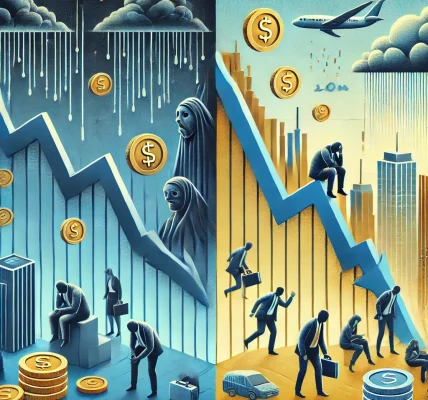The Economic Implications of Shifts in the Real Estate Market: What Investors Need to Know
The real estate market plays a significant role in shaping a nation’s economy. As one of the largest sectors, fluctuations in real estate prices and market dynamics can have far-reaching consequences for both individual investors and the broader economic landscape. Whether you’re a seasoned investor or just starting out, understanding the economic implications of shifts in the real estate market is crucial for making informed decisions that can impact your financial future.
In this blog, we’ll explore how changes in the real estate market affect the economy, what factors drive these shifts, and how investors can navigate these changes for maximum returns.
1. What Causes Shifts in the Real Estate Market?
Shifts in the real estate market—whether upward or downward—can occur due to several economic, social, and political factors. Some of the most common drivers of real estate market fluctuations include:
A. Interest Rates and Monetary Policy
Interest rates are one of the most influential factors in the real estate market. Central banks adjust interest rates to control inflation and stabilize the economy, and these changes directly impact mortgage rates and the cost of financing.
- Rising Interest Rates: Higher interest rates make borrowing more expensive, which typically slows down demand for real estate. Fewer buyers in the market can lead to price declines and less investment activity.
- Falling Interest Rates: Lower rates make borrowing cheaper, encouraging more people to take out mortgages and invest in properties. This increased demand can drive prices up.
B. Economic Growth and Employment
The overall health of the economy has a direct impact on the real estate market. When the economy is growing and employment rates are high, consumers have more disposable income and greater confidence in making large investments like purchasing homes or commercial properties.
- Strong Economic Growth: Increased consumer spending and business investments lead to higher demand for real estate, driving prices up.
- Recessions: During economic downturns, high unemployment and lower consumer confidence lead to reduced demand, which can cause property prices to fall.
C. Government Policies and Regulations
Government policies, including tax incentives, property regulations, and housing subsidies, can significantly affect the real estate market. Changes in zoning laws, property taxes, and incentives for first-time buyers or real estate developers can either spur or slow down market activity.
- Supportive Policies: Tax cuts or subsidies for homebuyers can stimulate demand in the residential real estate market.
- Restrictive Policies: Rent control, stricter lending laws, or increased taxes on properties can suppress demand and slow market growth.
D. Demographic Trends
The real estate market is heavily influenced by demographic trends, such as population growth, migration patterns, and aging populations.
- Urbanization: As more people move to cities, there is increased demand for housing, which can drive up property prices in urban areas.
- Aging Population: In regions with aging populations, demand may shift from larger family homes to smaller, more manageable properties or retirement communities.
Key Takeaway: Shifts in interest rates, economic growth, government policies, and demographic trends can cause significant fluctuations in the real estate market, impacting property values, investment opportunities, and the overall economy.
2. How Do Shifts in the Real Estate Market Affect the Economy?
Real estate is not just a sector—it is an economic engine that drives growth and influences various other industries. The effects of shifts in the real estate market can be seen in several key areas of the economy:
A. Wealth Creation and Consumer Confidence
Real estate is a key driver of wealth creation for many individuals. Homeownership, in particular, is often the largest asset for families. A rise in real estate prices can increase household wealth, boosting consumer confidence and encouraging spending in other areas of the economy.
- Booming Real Estate Market: Rising property values create a “wealth effect,” where homeowners feel wealthier and are more likely to spend on goods and services.
- Falling Real Estate Market: Conversely, declining home prices can erode household wealth, leading to lower consumer confidence and reduced spending.
B. Impact on Construction and Employment
The real estate market also affects construction and related industries, such as architecture, engineering, and materials supply. A booming market leads to more construction projects, job creation, and a ripple effect in local economies.
- Strong Market: Increased demand for residential, commercial, and industrial properties leads to more construction projects, creating jobs and stimulating economic growth.
- Weak Market: A downturn in the real estate market can lead to reduced construction activity, job losses in related sectors, and economic stagnation in regions dependent on real estate.
C. Banking and Credit Markets
Real estate transactions are closely tied to the banking and credit markets, as most people finance their property purchases with mortgages. Shifts in the real estate market can impact the stability and liquidity of financial institutions.
- Rising Property Values: When property values rise, banks can issue more loans as collateral values increase, fostering lending activity and boosting the economy.
- Falling Property Values: In a downturn, falling property prices may lead to higher default rates on loans, which can negatively affect banks’ balance sheets and lead to tighter lending conditions.
D. Local and Regional Economies
Real estate shifts also have localized effects. For example, rapid gentrification in certain neighborhoods or cities can lead to economic growth in those areas, attracting businesses and investment. Alternatively, if a real estate bubble bursts, entire communities may face economic hardship.
Key Takeaway: Real estate market shifts have far-reaching consequences that extend beyond property prices—they influence consumer behavior, employment rates, bank lending, and regional economic health.
3. What Do Real Estate Market Shifts Mean for Investors?
For investors, understanding the economic implications of shifts in the real estate market is critical for making profitable decisions. Here are a few key considerations for navigating changes in the market:
A. Recognizing Market Cycles
Real estate markets typically move in cycles: expansion, peak, contraction, and recovery. By recognizing where the market is in its cycle, investors can make strategic decisions.
- Expansion Phase: During this phase, property values rise, making it an opportune time to buy or invest in appreciating assets.
- Peak Phase: When the market is at its peak, caution is advised, as property values are high and may be due for a correction.
- Contraction Phase: If the market is in a downturn, investors may face declining property values, but it can also present opportunities for bargain buys.
- Recovery Phase: As the market begins to recover, investors can look for undervalued properties poised for future appreciation.
B. Diversifying Investment Strategies
To mitigate risks associated with shifts in the real estate market, investors should diversify their portfolios across different property types (residential, commercial, industrial) and locations (urban, suburban, international).
- Residential Properties: Residential real estate can provide stable returns, especially in markets with strong demand and low supply.
- Commercial Properties: Commercial real estate, such as office buildings or retail spaces, may offer higher returns but can be more vulnerable to market shifts, particularly in economic downturns.
- Real Estate Investment Trusts (REITs): REITs offer investors a way to diversify into real estate without the need for direct property ownership.
C. Considering Inflation and Interest Rates
Investors should closely monitor interest rate movements, as they directly affect the cost of financing and property demand. Rising interest rates can slow down market activity, while lower rates may provide opportunities for property acquisitions.
- Inflation Hedge: Real estate has historically been a good hedge against inflation, as property values tend to rise during inflationary periods.
Key Takeaway: Understanding real estate market cycles, diversifying investments, and monitoring macroeconomic factors like interest rates can help investors capitalize on opportunities and mitigate risks in a shifting market.
4. Conclusion: Navigating Real Estate Market Shifts
The real estate market is a crucial component of the global economy, and shifts within it can have profound effects on economic growth, consumer behavior, and investment opportunities. For investors, understanding the causes and economic implications of these shifts is key to making informed decisions and safeguarding assets.




